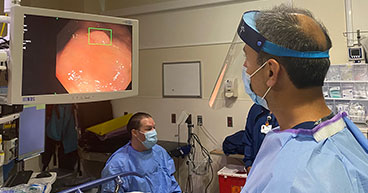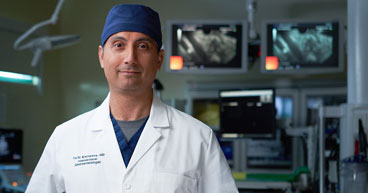
Artificial intelligence (AI) has been around long before developers started to write algorithms for it.
Historians point to automatons built in ancient times and later by Leonardo da Vinci in 1495 as the earliest examples of AI. In 1920, Czech playwright Carl Kapok wrote “R.U.R. (Rossum’s Universal Robots), a cautionary tale about how robots built to serve humans developed the intelligence to realize they were superior. And the term AI was first referenced in the 1950s by Dartmouth College scientist John McCarthy.
But while AI was historically viewed as the stuff of the future or science fiction, portrayed in stories about talking computers or human-like androids, it has become a real-world reality integrated into multiple aspects of our lives—from helping with everyday tasks to diagnosing and treating disease, including cancer.
Don’t fret, however, thinking that machines will start treating your cancer or your next doctor will be an android. AI can’t replace a doctor who provides the quality and compassionate care you need and deserve. AI can’t hold your hand or offer words of comfort.
“The machine is not a physician with years of bedside experience, accumulated knowledge and real-life experience of each patient,” says Sanjeet Dadwal, MD, professor and Chief of the Division of Infectious Diseases at City of Hope®. “That is what a machine cannot learn.”
However, AI is a valuable tool that may:
- Offer screening and diagnostic recommendations after quickly analyzing a patient’s scans and images
- Point doctors to potential areas of concern during screening procedures, such as a colonoscopy
- Accelerate drug discovery by processing information from millions of data sets
- Predict possible treatment outcomes by analyzing treatment results from millions of previous patients and match them to current patients with similar profiles
- Offer patients information and diversions, such as music and meditation, through smart devices and virtual home assistants
In this article, we’re explore:
- AI and cancer detection
- AI and cancer treatment
- AI and cancer research
- Other ways AI is changing cancer care
If you’ve been diagnosed with cancer and want to get a second opinion on your diagnosis or cancer care, call us or chat online with a member of our team.
AI and cancer detection
A good doctor taps into his or her experience, using all she or he has learned over a career to make an accurate diagnosis or develop a treatment plan. Imagine if a doctor could tap into information that has been gathered from thousands or millions of other similar cases.
AI allows that to happen.
“The impact of AI on early cancer detection is profound, with two areas particularly noteworthy,” Toufic Kachaamy, MD, a gastroenterologist and Chief of Medicine at City of Hope® Cancer Center Phoenix. “First, AI's capability to synthesize diverse data forms—from genetic markers to lifestyle factors—enables a nuanced stratification of patient risk. This holistic approach promises a more tailored and effective early detection strategy. Also, AI excels in the analysis of vast data sets to develop blood-based, multi-cancer early detection assays. These innovative techniques hold the potential to radically transform our approach to cancer screening, making it both more accessible and comprehensive.”
Dr. Kachaamy has embraced AI, including a tool called GI Genius®, a companion program he runs during a colonoscopy. GI Genius uses information inputted from thousands of previous procedures to point him to potential areas of concern in the colon. From there, Dr. Kachaamy can determine if that are requires further investigation.
“This has been an excellent addition to our cancer-fighting arsenal,” Dr. Kachaamy says.

Dr. Kachaamy performs a colonoscopy using GI Genius.
AI and cancer treatment
From immunotherapy to robotic surgery to stem cell transplants, cancer treatments have advanced by leaps and bounds in recent decades.
Still, every patient is different and reacts to treatments in different ways. What works for one patient may not work for another. While one patient may recover quickly from surgery or a transplant, another may develop complications.
New AI tools may make it more possible to better predict treatment outcomes.
It has the ability to analyze large data sets, find correlations difficult to identify by current methods and analyze genetic mutations. This allows AI to help doctors make sure treatment protocols are tailored to specific patients while minimizing risk of side effects and avoiding treatments that may be ineffective.
For example, immune checkpoint inhibitors have produced good outcomes for millions of patients with difficult cancers, such as melanoma. But these drugs are less than effective in more than 50 percent of patients.
Researchers at the National Cancer Institute are developing an AI tool designed to help predict which patients may respond to checkpoint inhibitors and which ones may not. Among the factors the algorithm analyzes are a patient’s age, cancer type, treatment history, blood albumin level and blood neutrophil-to-lymphocyte ratio. This tool may eventually help increase the number of patients who will benefit from checkpoint inhibitors.
Doctors at City of Hope have developed an AI model designed to predict which stem cell transplant patients may develop sepsis, a dangerous and fast-growing blood infection. Up to 10 percent of transplant patients develop sepsis, which comes on rapidly with few early symptoms. Patients who develop sepsis often have poorer treatment outcomes than those who do not get the infection.
City of Hope doctors also have developed an AI model to help predict which surgical patients may develop complications, such as bleeding, respiratory or cardiac distress or poor wound healing.
“Having a better ability to predict who is at risk for postoperative complications can help with preoperative optimization of the patient, as well as improve the consenting process for the patient and family,” says Lily Lau Lai, MD, a colorectal surgeon and professor at City of Hope
AI and cancer research
Advances in cancer care don’t happen without research. And research takes time to analyze patient data and treatment outcomes.
AI has the potential to accelerate drug and treatment discovery by analyzing vast amounts of data in minutes, not months or years. Algorithms may also be used to better identify suitable patients for a trial. And AI programs may be able to predict outcomes, allowing researchers to move in specific directions that may produce better results for patients.
AI tools may also be able to spot biases in clinical trial data that may affect outcomes for patients in various racial and ethnic groups.
Other ways AI is changing cancer care
Beyond AI’s impact on clinical treatments and diagnoses, it also is changing cancer care in ways we often don’t even think about. Here are just a few examples.
Administration: AI-powered programs often work behind the scenes at hospitals and doctors’ offices, helping with scheduling, billing and administrative duties.
Health care coverage: Insurance companies may use AI to help process claims or spot fraudulent activity.
Monitoring vital signs: Smart watches and other wearable devices help patients monitor physical activity and heart rate.
Digital assistants: Virtual home assistants—think Siri or Alexa, with a medical background—may answer patient questions, offer medication reminders or play music or peaceful sounds to help patients relax.
“The biggest challenge for adopting AI is human resistance and trust,” Dr. Kachaamy says. “The Food and Drug Administration currently has robust criteria for AI approval for health care use ensuring safety, reliability and that they deliver on their promise. Patients should not be concerned about FDA approved AI applications in health care.”
If you’ve been diagnosed with cancer and want to get a second opinion on your diagnosis or cancer care, call us or chat online with a member of our team.



